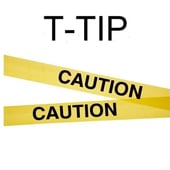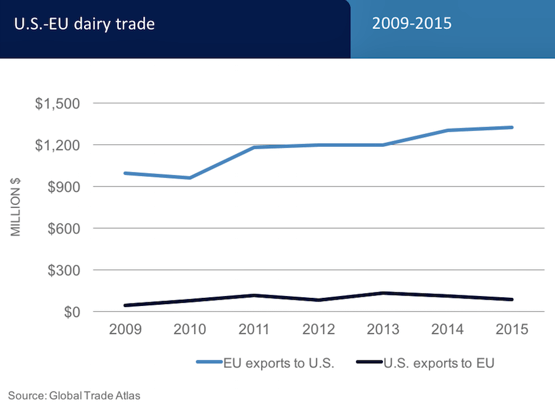-
Three Reasons Rushing T-TIP Concerns U.S. Dairy
By USDEC June 1, 2016- Tweet
A hurried Transatlantic Trade and Investment Partnership would tilt an already unlevel playing field toward the European Union.
Trade negotiations and rapidity are concepts that don’t typically work well together. Both the United States and the European Union have pledged to conclude Transatlantic Trade and Investment Partnership (T-TIP) negotiations this year. That is why it is so concerning that a host of issues, including critical dairy concerns, are nowhere near resolution.

“It is unclear how the two sides can reach an agreement that satisfactorily addresses the wide range of non-tariff barriers to trade, including the EU’s global geographical indications (GIs) which restrict sales of common food products, in only seven months,” says Tom Suber, president of the U.S. Dairy Export Council (USDEC). “U.S. negotiators should not conclude a T-TIP agreement without removing the existing barriers to U.S. exports and ensuring that new ones won’t immediately spring up to take their place. A bad deal is far worse than no deal at all.”
The U.S. dairy industry is united in its concern that dairy issues will not be appropriately resolved under that timeline. In a joint news release, USDEC, the National Milk Producers Federation and the International Dairy Foods Association praised a bipartisan group of senators for urging U.S. negotiators to remain firm in addressing the needs of U.S. agriculture, including key dairy issues.

“The United States runs an annual $1-billion-plus dairy trade deficit with the European Union, and it is not because we have inferior products or our suppliers do not know how to export,” says Suber. “The playing field is decidedly tilted toward the EU. U.S. suppliers to Europe face far greater barriers to trade and risk of requirements shifting than do EU suppliers to the United States, and given the EU’s T-TIP efforts, the bloc is looking to make it even more lopsided.”
Over the years, Free Trade Agreements have benefited the U.S. dairy industry. USDEC has supported nearly every FTA, including the recent Trans-Pacific Partnership. But the push to finalize a T-TIP agreement this year despite a lack of progress on key dairy issues is worrisome, the USDEC board has concluded.
Three major areas, all of them vital, concern the U.S. dairy industry, given the ample work still remaining to address them:
1. Inappropriate non-tariff barriers.
Tackling tariffs means nothing if U.S. negotiators fail to remove existing EU non-tariff barriers to trade and gain assurances there will be no new non-tariff barriers erected. Failure in this area would only serve to deepen the existing dairy trade gap.
The EU is adept at developing creative ways to hinder agricultural trade, particularly for dairy. Current challenges include:
- Shifting certification requirements that make market access more difficult than it should be.
- Cumbersome licensing procedures that essentially prevent U.S. companies from winning commercially viable allotments of existing World Trade Organization tariff rate quotas.
- Duplicative inspection requirements that add undue complications to exports of dairy products for feed use.
- And certain EU mandates, like those for somatic cell counts, that impose restrictions on U.S. suppliers based on a quality standard and not a food safety standard.
But based on the EU’s past behavior and ongoing discussions in Europe, future challenges could very likely also emerge such as:
- Country of origin labeling for dairy products and their ingredients.
- Bans on dairy and meat from the offspring of cloned animals.
- Prescriptive animal welfare requirements unaligned to U.S. practices.
Given this, the first batch of issues can’t be viewed as static obligations for U.S. negotiators to resolve point by point in T-TIP talks. You can’t put an end to a game of “whack-a-mole” by simply hitting the current targets.
“We are seeking broader approval of the U.S. safety system in T-TIP to secure a simplified dairy certificate but also assurances that new, unjust, unscientifically-supported requirements for government statements (such as for animal welfare or cloning) will not be layered on top of it,” says Suber. “T-TIP needs to anticipate the strong likelihood that the bloc will continue erecting dairy non-tariff barriers and needs to include measures to prevent that from happening.”
2. Excessively high tariffs.
EU out-of-quota dairy tariffs are extremely high. On cheese, butterfat, and unsweetened milk powder or whey protein products, U.S. suppliers face tariffs ranging from €123-€221/100 kg net (about US$1,380-$2,479/ton).
Even in-quota tariff rates are excessive in many cases. U.S. in-quota butter exports to the EU, for example, face a 26 percent tariff. The EU by contrast faces only a 2.5 percent tariff when shipping butter to the United States.
On average EU dairy tariffs are three times more than those of the United States. T-TIP needs to not only address the disparity between EU and U.S. tariff rates, but also do so in a coordinated manner that reflects that starting-point disparity.
3. Restriction of common food names via GIs.
The EU is pushing harder than ever to restrict the use of common food names through its system of geographical indications, and its pressure is increasingly politicized. Recent statements from leaders in France and Greece and from European Commission officials echo a long-standing hard line on GIs, asserting they would accept no T-TIP deal unless the United States vowed to recognize the EU’s food and beverage GIs as part of it, in effect turning over categories worth millions of dollars.
The EU is seeking to protect a list of more than 200 GIs, including many cheeses, some of which are generic names. And if it gets its way in T-TIP, that list will grow in the future.
Although the EU suggested it would be willing to consider excluding generic names from GI protection, its definition of “generic” clearly differs from the U.S. definition, leaving names like asiago, feta, gorgonzola, munster and parmesan still under threat.

The EU is seeking to strip away the rights of U.S. cheesemakers to manufacture and market products under names that in some cases have been used for more than a century. The threat is global: The bloc is using T-TIP to accomplish that goal in the United States and using bilateral deals to block U.S. exports in third countries.
The EU is also proposing to use several U.S. legal mechanisms in T-TIP (separate from U.S. trademark law) to ensure GI enforcement. Such a move would put the costs of GI enforcement for hundreds of protected names on the shoulders of the U.S. government, giving yet another leg up to all EU manufacturers.
Even the smallest U.S. companies manage to register and defend their own intellectual property by themselves, typically through trademarks. There is no reason why EU companies should not only have a free ride but also seize control of specific varieties through misuse of GIs.
“USDEC is not inherently opposed to GIs. But the EU’s approach to restrict the use of generic names during trade negotiations focused on improved trade rules runs counter to the very nature of the endeavor,” says Suber. “Recent comments indicate that the EU’s strategy continues to see GIs as a bargaining chip in trade talks.”
Calling it “quid pro quo,” a European Commission source was recently quoted as baldly stating that the size of the EU offer to the U.S. on new pork, poultry and beef access will depend on the GI issue. Imposing restrictions on one industry in order to advantage another, however, is not an approach that the U.S. has embraced in past trade deals.
 “Trade agreements are about tearing down barriers, not erecting new ones,” says Suber. “The EU’s GI scheme is clearly intended to provide commercial advantage to certain EU manufacturers and to gain support from one U.S. agricultural sector for imposing new barriers on another. That type of destructive and divisive approach to trade will not result in a positive agreement that can garner strong Congressional support.”
“Trade agreements are about tearing down barriers, not erecting new ones,” says Suber. “The EU’s GI scheme is clearly intended to provide commercial advantage to certain EU manufacturers and to gain support from one U.S. agricultural sector for imposing new barriers on another. That type of destructive and divisive approach to trade will not result in a positive agreement that can garner strong Congressional support.”Negotiators from the United States and the EU will gather in Brussels in July for the 14th round of T-TIP talks.
“We commend the U.S. government’s work in defending common names against an aggressive EU GI agenda,” says Suber. “It is a challenging global issue and we urge them to stay the course by continuing to push back against attempts to abuse the very notion of a free trade agreement by using it to impose new barriers and limit competition.”
Learn more:
- Register for June 21 Protecting Your Food Names Seminar
- Why Europe Must not own 'Parmesan' and 'Feta'
- List of USDEC resources about the Trans-Pacific Partnership
- How Free Trade Agreements Ignited U.S. Dairy Exports to 6 Countries
- Study: Free Trade Agreements Helped Bring $8.3 Billion to U.S. Dairy Over 10 Years
Subscribe to the U.S. Dairy Exporter Blog
The U.S. Dairy Export Council fosters collaborative industry partnerships with processors, trading companies and others to enhance global demand for U.S. dairy products and ingredients. USDEC is primarily supported by Dairy Management Inc. through the dairy farmer checkoff. How to republish this post.
10 Most Recent Posts
Most Popular Posts in Past Year
Index of Posts by Topic
- #GotDairyJobs (4)
- About USDEC (67)
- Africa (6)
- Australia (4)
- Blog (8)
- Brazil (4)
- Canada (20)
- Central America (1)
- Cheese (58)
- Chile (1)
- China (54)
- Common food names (7)
- Company News (20)
- Consistent Supply (1)
- Crisis Management (3)
- Cuba (2)
- Dairy (6)
- Dairy checkoff (9)
- Dairy Ingredients (5)
- Dairy Management Inc. (2)
- Dairy Resources (1)
- Dairy Supply Chain (1)
- Dairy Trends (5)
- Documentation (3)
- EU (24)
- Experts on Dairy Exports (4)
- Exporter of the Year (2)
- Exports (24)
- Farmer leaders (1)
- Farming (38)
- Food Aid (8)
- Food Safety (8)
- Foodservice (3)
- Free trade agreements (34)
- Future trends (1)
- Geographical Indications (GIs) (10)
- Global Marketing (86)
- Global Shipping Crisis (1)
- Got Jobs? (9)
- Indonesia (1)
- Innovation (17)
- Japan (17)
- Krysta Harden (1)
- Market Access (25)
- Market Conditions (271)
- Member Services (17)
- Mexico (41)
- Middle East (9)
- Middle East & North Africa (3)
- Middle East/North Africa (9)
- Milk (4)
- Milk Protein Concentrate (MPC) (2)
- New Zealand (11)
- Next5% (20)
- Nonfat Dry Milk/Skim Milk Powder (8)
- Nutrition (19)
- Product Innovation (6)
- Protein (4)
- Regulations (5)
- Research & Data (329)
- Russia (3)
- Singapore (10)
- South America (8)
- South Korea (10)
- Southeast Asia (25)
- Strategic Insights (1)
- Supply (1)
- Sustainability (26)
- Technology (2)
- ThinkUSADairy (5)
- TPM23 (1)
- TPP (13)
- Traceability (8)
- Trade Barriers (5)
- Trade Data (7)
- Trade Policy (72)
- TTIP (5)
- UHT Milk (7)
- USMCA (2)
- Vietnam (4)
- Whey (6)
- Whey Ingredients (2)
- Whey products (10)
- Whole Milk Powder (WMP) (3)
- World Dairy Expo (1)
- World Milk Day (1)
- Yogurt (1)
Index of Posts by Date, Author
- June 2021 (13)
- March 2015 (12)
- September 2015 (12)
- April 2015 (11)
- December 2015 (11)
- March 2014 (10)
- February 2015 (10)
- October 2015 (10)
- October 2014 (9)
- June 2015 (9)
- July 2015 (9)
- November 2015 (9)
- March 2016 (9)
- October 2019 (9)
- September 2013 (8)
- May 2015 (8)
- August 2015 (8)
- January 2016 (8)
- February 2016 (8)
- March 2017 (8)
- December 2018 (8)
- May 2019 (8)
- December 2019 (8)
- June 2014 (7)
- November 2016 (7)
- May 2017 (7)
- May 2018 (7)
- July 2020 (7)
- June 2023 (7)
- July 2016 (6)
- August 2018 (6)
- October 2018 (6)
- November 2018 (6)
- February 2019 (6)
- June 2019 (6)
- August 2019 (6)
- March 2020 (6)
- April 2020 (6)
- June 2020 (6)
- June 2022 (6)
- February 2014 (5)
- June 2016 (5)
- August 2016 (5)
- September 2016 (5)
- December 2016 (5)
- February 2017 (5)
- July 2017 (5)
- October 2017 (5)
- January 2018 (5)
- April 2018 (5)
- June 2018 (5)
- July 2018 (5)
- September 2018 (5)
- January 2019 (5)
- March 2019 (5)
- April 2019 (5)
- July 2019 (5)
- September 2019 (5)
- November 2019 (5)
- January 2020 (5)
- August 2020 (5)
- October 2020 (5)
- April 2021 (5)
- January 2022 (5)
- May 2013 (4)
- September 2014 (4)
- April 2016 (4)
- May 2016 (4)
- October 2016 (4)
- January 2017 (4)
- April 2017 (4)
- June 2017 (4)
- August 2017 (4)
- September 2017 (4)
- December 2017 (4)
- February 2018 (4)
- February 2020 (4)
- May 2020 (4)
- February 2022 (4)
- September 2022 (4)
- April 2023 (4)
- December 2023 (4)
- November 2017 (3)
- March 2018 (3)
- September 2020 (3)
- December 2020 (3)
- February 2021 (3)
- May 2021 (3)
- August 2021 (3)
- December 2021 (3)
- March 2022 (3)
- April 2022 (3)
- May 2022 (3)
- October 2022 (3)
- December 2022 (3)
- May 2023 (3)
- July 2023 (3)
- November 2023 (3)
- January 2026 (3)
- March 2011 (2)
- June 2011 (2)
- September 2011 (2)
- March 2012 (2)
- June 2012 (2)
- July 2012 (2)
- March 2013 (2)
- July 2013 (2)
- November 2020 (2)
- January 2021 (2)
- March 2021 (2)
- July 2021 (2)
- September 2021 (2)
- October 2021 (2)
- November 2021 (2)
- July 2022 (2)
- August 2022 (2)
- January 2023 (2)
- March 2023 (2)
- October 2023 (2)
- January 2024 (2)
- February 2024 (2)
- April 2024 (2)
- June 2024 (2)
- July 2024 (2)
- November 2024 (2)
- December 2024 (2)
- February 2025 (2)
- June 2025 (2)
- July 2025 (2)
- September 2025 (2)
- November 2025 (2)
- December 2025 (2)
- January 2010 (1)
- February 2010 (1)
- March 2010 (1)
- April 2010 (1)
- May 2010 (1)
- June 2010 (1)
- July 2010 (1)
- August 2010 (1)
- September 2010 (1)
- October 2010 (1)
- November 2010 (1)
- December 2010 (1)
- January 2011 (1)
- February 2011 (1)
- April 2011 (1)
- May 2011 (1)
- July 2011 (1)
- August 2011 (1)
- October 2011 (1)
- November 2011 (1)
- December 2011 (1)
- January 2012 (1)
- February 2012 (1)
- April 2012 (1)
- August 2012 (1)
- September 2012 (1)
- October 2012 (1)
- November 2012 (1)
- December 2012 (1)
- January 2013 (1)
- February 2013 (1)
- April 2013 (1)
- June 2013 (1)
- August 2013 (1)
- October 2013 (1)
- November 2013 (1)
- December 2013 (1)
- January 2014 (1)
- April 2014 (1)
- May 2014 (1)
- November 2022 (1)
- February 2023 (1)
- August 2023 (1)
- September 2023 (1)
- March 2024 (1)
- May 2024 (1)
- August 2024 (1)
- September 2024 (1)
- October 2024 (1)
- January 2025 (1)
- March 2025 (1)
- April 2025 (1)
- May 2025 (1)
- August 2025 (1)
- February 2026 (1)
- USDEC (183)
- USDEC Staff (167)
- Alan Levitt (119)
- Tom Suber (41)
- Margaret Speich (22)
- Marc A.H. Beck (15)
- Vikki Nicholson-West (11)
- Angélique Hollister (11)
- Tom Vilsack (8)
- Jaime Castaneda (7)
- Matt McKnight (7)
- Véronique Lagrange (7)
- Margaret Speich and Mark O'Keefe (7)
- Ross Christieson (7)
- Paul Rogers (6)
- Shawna Morris (5)
- William Loux (5)
- Alan Levitt and Marc Beck (5)
- Krysta Harden (4)
- USDEC Communications (3)
- Kristi Saitama (3)
- Marilyn Hershey (3)
- Brad Gehrke (3)
- Tom Quaife (2)
- Nick Gardner (2)
- Jim Mulhern (2)
- Alan Levitt and William Loux (2)
- Kara McDonald (2)
- Luke Waring (2)
- Merle McNeil (2)
- Krysta Harden, USDEC President and CEO (2)
- Andrei Mikhalevsky (1)
- Rodrigo Fernandez (1)
- Dermot Carey (1)
- Jeremy Travis (1)
- Annie Bienvenue (1)
- Ross Christieson and Shawna Morris (1)
- Becky Nyman (1)
- Paul Rogers and Tom Quaife (1)
- Rick Ortman (1)
- Tony Rice (1)
- Barbara O’Brien (1)
- Paul Rogers and Mark O'Keefe (1)
- Dalilah Ghazalay (1)
- Amy Wagner (1)
- Mitchell Bowling (1)
- Erica Louder (1)
- Brad Scott (1)
- Amy Foor (1)
- Scott Lantz (1)
- Sandra Benson (1)
- Errico Auricchio (1)
- Jaclyn Krymowski (1)
.png)

